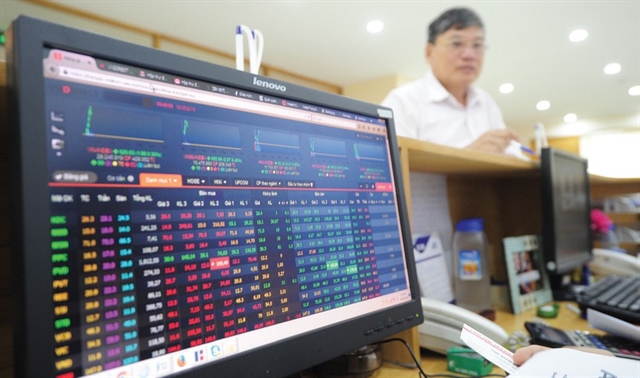 Economy
Economy


|
| Stock prices displayed on VNDirect Securities Co's platform. Vietnamese shares are forecast to keep struggling with a prolonged foreign capital outflow on fears about the coronavirus and a slowing-down economy. - Photo tinnhanhchungkhoan.vn |
HÀ NỘI – Foreign investors net-sold more than VNĐ1.1 trillion (US$47.5 million) worth of local stocks last week and the figure is forecast to keep rising on worries about the downgrade of the economy under the impact of the coronavirus.
Last week’s net-selling figure jumped nearly 600 per cent from the number recorded in the previous week.
Net foreign selling forced the benchmark VN-Index on the Hồ Chí Minh Stock Exchange and the minor HNX-Index on the Hà Nội Stock Exchange to fall 0.46 per cent and 1.50 per cent week-on-week.
Stocks pressurised by foreign capital outflow included Vietinbank (CTG), consumer goods firm Masan (MSN), property developers Vingroup (VIC) and Novaland (NVL), Bank for Investment and Development of Vietnam (BID), PetroVietnam Gas (GAS) and insurer Bảo Việt (BVH).
In February, foreign investors offloaded net value of VNĐ2 trillion while they net-bought a total of VNĐ1.9 trillion in the first month of the year.
In the pre-Tết (Lunar New Year) period between January 1 and January 22, foreign investors bought a net value of VNĐ2.12 trillion, but they have sold a net value of VNĐ2.25 trillion since the market returned from the Tết break.
The stronger foreign capital outflow concurred alongside the outbreak of the coronavirus – known as COVID-19 – in China and other countries in East Asia and Southeast Asia, which has raised concerns among investors about slowing regional economies.
Some Chinese companies have returned to work but operations have remained slow on fears of the spread of the virus. Chinese authorities have promised low lending rates and more stimulus packages to boost local production.
When the number of new cases in China has slowed down and the Chinese government seems to have taken control of the situation, South Korea has emerged as a place of growing concern.
By 4.30pm on Sunday, the total number of coronavirus infections was 78,860 and deaths stood at 2,464, according to Worldometer. China still led the chart with 76,940 people infected and 2,443 deaths.
South Korea was second with 602 cases and five deaths.
Viet Nam has reported 16 infected cases but all infected people have reportedly fully recovered.
According to SSI Research, COVID-19 has cut international organisations’ growth forecasts for economies in the region and fund managers and institutional investors have had to change their strategies.
The outbreak in China, South Korea and Japan – three of the largest manufacturing economies in the world – has led investors to fear that the Vietnamese economy will be heavily affected by the slowdown of industrial outputs in the three economies as Viet Nam is highly connected to all three.
Net foreign selling last week was a bad indicator, Sài Gòn-Hà Nội Securities (SHS) said in its weekly note. “Investors were still wary of the unpredictable development of COVID-19.”
Foreign capital has been withdrawn from emerging markets as investors look for shelter in safe havens such as bonds and gold, making gold prices hike and strengthening the US dollar against other currencies, VNDirect Securities (VNDS) said in a note.
“That explains the pressure that foreign investors have had on Vietnamese stocks in the last three weeks as they did in 2018 and 2019.”
Foreign investors would not stop selling soon, Bảo Việt Securities (BVSC) predicted.
The benchmark VN-Index is set to move between 920 points and 945 points this week, analysts forecast.
There was a lack of supportive news for the market at the moment and the pressure of foreign capital outflow will be prolonged, Ngô Quốc Hưng, senior analyst at MB Securities Co (MBS), told tinnhanhchungkhoan.vn.
“Capital is concentrating on bank stocks, which is understandable, and trading liquidity of bank stocks accounts for 40 per cent of the market total,” he said.
Investors were trying to take profits from large-cap stocks and moved into smaller companies, Hưng said.
“Small-cap stocks have gained for two straight weeks with increased liquidity while large-cap stocks’ growth is slowing down and they become less active on the market.” – VNS




